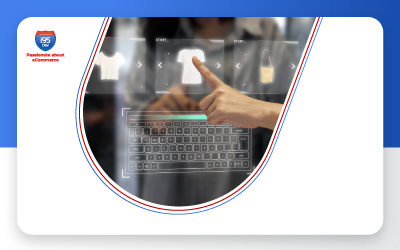The digital transformation of commerce is accelerating. According to Gartner, by 2025, a remarkable 80% of sales interactions between suppliers and buyers will happen through digital channels.
In such a competitive and fast-evolving market, manual processes and disconnected systems can hold your business back. If you’re still juggling data entry, inventory management, and order processing across disconnected platforms, chances are you’re leaving money on the table with inefficiencies, limiting your business growth, and falling behind competition.
Integrating your ERP system with your eCommerce platform is no longer optional—it’s a necessity. This integration is the key to unlocking efficiency, boosting automation, and driving productivity across your business.
Why eCommerce and ERP?
eCommerce and ERP are the two most critical systems in a business’ digital ecosystem. While they are two very different systems, each designed to meet very different objectives, there is a strong synergy between them.
Combining these two powerful systems creates a game-changing opportunity for businesses of all sizes. From enhanced inventory management and efficient order processing to real-time data synchronization, eCommerce and ERP integration opens the door to accelerated growth and improved customer satisfaction.
In this blog, we’ll build a case for integrating Shopify/ Shopify Plus and NetSuite ERP systems. Shopify is the most popular eCommerce platform loved by entrepreneurs and large businesses for its ease of use and quick setup. Meanwhile, NetSuite stands as one of the top Enterprise Resource Planning (ERP) tools, helping businesses automate key operations and streamline processes.
Ready to take your eCommerce business to the next level?
Let’s dive in!
Key Integration Touchpoints between Shopify/ Shopify Plus and NetSuite ERP systems:
Here are some of the most common and key touchpoints between Shopify/ Shopify Plus eCommerce and NetSuite ERP systems:
- Product/ Items: Products added in NetSuite ERP systems can be automatically synchronized with the Shopify eCommerce platform, enabling faster go to market and consistent product information across both platforms.
- Inventory Levels: The inventory information in NetSuite can be updated in real-time as products are sold on Shopify eCommerce store and across channels. The accurate inventory information is then synced from NetSuite ERP to Shopify eCommerce store, preventing stockouts and overselling of products.
- Orders Information: Orders from Shopify store can be automatically transferred to the ERP system for fulfillment. This helps businesses automate order fulfillment and minimize order aging. This is true for both B2B and B2C businesses. For B2B businesses, orders placed as drafts or quotes on Shopify, can be synced as Quotes in NetSuite ERP system.
- Companies and Contacts: Customer data can be synchronized between Shopify and NetSuite to build a comprehensive 360-degree view of customers.
- Shipping Information: Shipping updates and tracking information can be transferred from NetSuite to Shopify eCommerce store. Once transferred, the information can be used to keep customers informed and reduce calls to your customer service teams.
- Invoices: Once the order is placed, the payment information and invoice details can be synced between the two systems creating a foundation for better financial visibility and compliance.
Advantages of Automating Shopify/ Shopify Plus and NetSuite Integration
- Unified Data Management: NetSuite is a powerful ERP system that helps manage critical business functions like finance, inventory, orders, and customer relationships. When you integrate Shopify with NetSuite, your eCommerce and ERP systems work seamlessly together. This means real-time data updates, fewer errors, and smoother operations. With instant access to accurate information, your team stays aligned, avoids missteps, and delivers a better experience for your customers.
- Efficient Order Management: Integrating Shopify with NetSuite ensures seamless order processing and fulfillment. When a customer places an order, the details are automatically synced with NetSuite, eliminating the need for manual data entry and reducing errors.
- Real-Time Inventory Management: NetSuite’s powerful inventory management capabilities, combined with Shopify integration, ensure your eCommerce platform always reflects accurate, real-time stock levels. This prevents overselling, backorders, and stockouts, improving customer satisfaction and operational efficiency. With features like automated stock replenishment, trend-based inventory recommendations, and optimized stock allocation across locations, NetSuite helps streamline logistics, reduce storage costs, and keep your business running smoothly.
- Streamlined Financial Management: NetSuite manages financial processes like accounting and invoices. Integrating NetSuite with Shopify ensures accurate tracking of payments and taxes enabling improved financial visibility and compliance.
- Enhanced Customer Experience: NetSuite’s CRM functionality helps manage customer data, order history, and interactions. By integrating Shopify with NetSuite, customer information stays consistent across platforms, offering a unified view of customer interactions. This unified view streamlines and improves customer shopping experience.
- Scalability and Growth: As your business grows, the integration between Shopify and NetSuite grows with you. It offers a solid foundation for managing higher order volumes, expanding product lines, and handling more complex business processes without missing a beat.
- Automation and Efficiency: This integration automates the data flow between Shopify and NetSuite, reducing the need for manual data entry and cutting down the chances of errors. By streamlining these processes, it allows your team to focus on more strategic initiatives rather than being bogged down by routine tasks.
- Compliance and Reporting: NetSuite provides powerful reporting and analytics tools, and with integration, your eCommerce data is automatically synced for reporting purposes. This not only helps you make more informed business decisions but also ensures you stay compliant with industry regulations.
These are just a few of the many benefits of connecting your eCommerce and ERP systems. Read 18 Crucial Reasons You Should Integrate ERP & eCommerce for more benefits.
Don’t Miss Out: Assess Your Shopify-NetSuite Integration Needs Today
If you’re managing Shopify and NetSuite systems separately, it’s time to rethink how you’re running your business. Integrating these two platforms could be a game-changer for your business.
- Review Your Current Workflows: Take a step back and think about your current processes. Are your team spending hours on manual tasks that could be automated? These are the areas where integration can help the most, saving you time, reducing errors, and freeing up your team to focus on more important tasks.
- Know Your Data: What information drives your business? Whether it’s orders, customer data, or financial records, it’s critical to keep everything accurate and up to date. Integration can help you ensure that, reducing the chance of mistakes and keeping your business running smoothly.
- Think About the ROI: Integrating Shopify with NetSuite isn’t just about making things easier—it’s about saving money. If you’re still doing things manually, you’re likely wasting resources on labor, errors, and inefficiencies. Once you integrate, you’ll see a clear return on investment as automation cuts down on costs and improves accuracy.
The longer you wait, the more time and revenue you’re losing. Don’t let outdated processes hold you back. Read our blog, How to Identify if you Need Automated E-commerce and ERP Integration? for more information.
With the Right Partner, Shopify and NetSuite Integration is Seamless
Integration projects may seem daunting, but with the right partner, they can be effortless. By selecting the right approach and leveraging expert support, you can avoid potential challenges that could impact your integration project. Shopify and NetSuite integration can be a smooth, efficient process when you carefully consider your business’s unique needs and plan accordingly.
Embracing the Power of Integration with i95Dev
At i95Dev, we understand the challenges associated with integration and specialize in delivering out-of-box and customized eCommerce and ERP integration solutions. We have a ready to deploy integration product for various combinations of eCommerce and ERP systems including Shopify/ Shopify Plus and NetSuite systems. 350+ customers across 25+ industries trust us with their integration needs.
If you have any questions or need more information, reach out and talk to our integration experts today. Our integration experts ensure that your integration projects are handled with care, precision, and in line with your specific requirements.
Every business has its own set of requirements, and taking the time to identify and address these from the start can save you time and money in the long run. Instead of tackling problems down the road, invest time in planning and selecting the right partner now for smooth, successful integration.
Not on Shopify? At i95Dev, we also support eCommerce platforms like Adobe Commerce (Magento) and BigCommerce. Contact us for more information.





